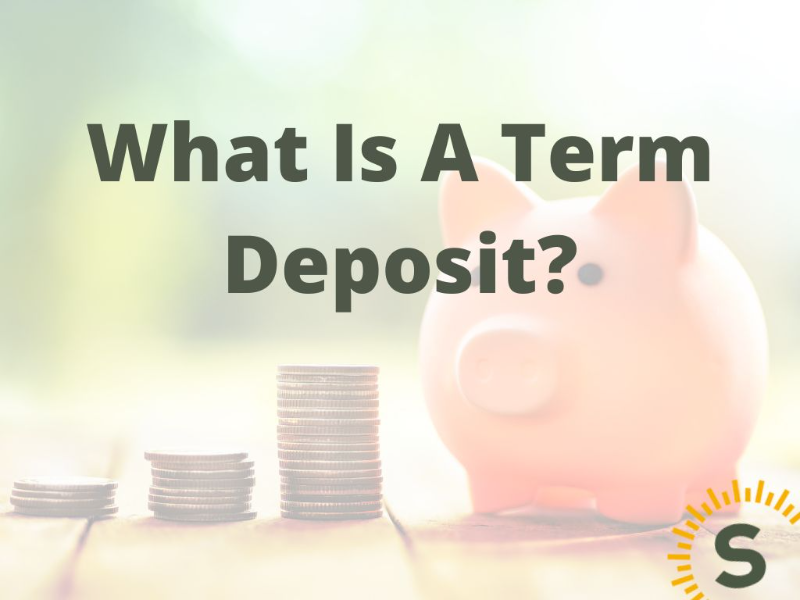
If you're looking at your savings options, you may be left wondering, "What is a term deposit?". If you are looking to make the most of your cash, you are on track by wondering. In this insight, we cover all you need to know and answer the question, what are and how do term deposits work?

Term deposits are lump-sum savings accounts with fixed terms. Term deposit accounts come in a variety of lengths, usually from six months to five years. Term deposits are typically referred to as fixed-term deposits or fixed-rate bonds in the UK.
From the time you start the account until the conclusion of the predetermined period, you will not have access to your funds, and if you withdraw you will face a penalty.
You make a one off deposit into a bank account, and that becomes your term deposit account. You agree to earn an agreed interest rate up front, so you will know exactly what your deposit will be worth upon maturity. A term deposit normally allows deposits starting at £500 and can allow up to £2 million. The funds are not invested. There is no risk of the value fluctuating. This is a cash based product.
The risks you face as follows:
It's vital to realise you typically won't be allowed to make any withdrawals until you've reached the end of your defined period. At which point you'll receive your initial deposit, plus any interest you've accrued. You might be able to make a withdrawal from some financial institutions before the end of your term, but you'll have to close your account and you might be penalised on any interest you've earned.
No, there is no investment risk with a deposit. You will receive your entire deposit back along with any interest you have accrued upon maturity.
Should the provider go bankrupt, you are covered by the financial services compensation scheme.
If a Bank is unable to meet their obligations, you may be entitled to compensation through the financial services compensation scheme. You will be covered up to £85,000 per provider.
Yes, you must pay tax on the interest you receive from a fixed term deposit. This income forms part of your income tax calculations, and the amount you need to pay is determined using your personal tax rate. However, you may use your personal interest allowance of up to £1,000 tax free. If you are looking for tax free savings options, take a look at our Sunny Avenue guide to your ISA insight.
The UK personal interest allowance is a tax relief available to individuals on the interest they earn on savings and investment income. It allows individuals to earn up to £1,000 of interest tax-free, which can be claimed as a deduction from their total taxable income. This allowance was introduced in 2017 as part of the government's efforts to support savers and encourage individuals to save for their future.
When you agree to tie your savings away, the bank can use your money for a longer length of time. That gives the bank more time to use the money in ways to generate a return for them. Because of this, the bank can offer you a higher interest rate. The disadvantage is that your money cannot be accessed during the fixed deposit term, and generally, there are penalties for early withdrawal.
The alternative to locking your money away is an instant access savings account. Instant access savings accounts provide greater flexibility as there are no fees if you withdraw the money at any time. However, because the bank must be ready to access the money at any moment, the interest rates on these accounts are often lower than those on term deposits.
It's important to take your savings goals and timeframe into account when choosing between term deposits and instant-access savings accounts. A term deposit can be a better choice if you have a defined savings target and a time frame to achieve it. An instant access savings account might be better, if you need flexibility and accessibility to the money.
A Fixed rate bond is just another name for a term deposit. Different institutions use different names to describe these accounts, but they are the same. They involve locking your funds away for a pre-determined time for an agreed interest rate.
A notice account is a form of savings account that needs notice to be accessed. Notice required is often 30 or 60 days in advance. Withdrawals can't be made without notice. Although the interest rates on notice accounts are often higher than instant access, they do not provide as easy access to the money.
If you are organised enough and saving for a certain objective, you can schedule your withdrawals in advance.
The UK government provides premium bonds. If you buy premium bonds, you are not guaranteed a fixed rate of interest. Instead, you are provided the possibility to win tax-free prizes in a monthly lottery. The prize can range in value, but the top award is £1 million.
With a one in 34,500 chance of winning a reward for a £1 bond, the chances of winning a prize with premium bonds are low.
It is important to carefully choose between premium bonds and fixed term savings accounts. Premium bonds offer the opportunity to win big tax free prizes, but the odds are low. Whereas, fixed term savings offer you a guaranteed interest rate. It is an assured way to see your savings grow.
Yes, a financial advisor can assist with your savings and investment planning by offering direction and advice on how to manage your savings. To optimise your savings potential, they can help you develop a savings plan, set savings objectives, and suggest investment options. Financial advisers can also offer advice on tax-efficient saving solutions and assist you in sticking to your savings schedule.
If you are looking for advice on your savings, but are unsure where to start, Sunny Avenue can help. Our savings and investment Sunny fact find helps us to understand your circumstances, and then we find the most suitable adviser from our directory to contact you for a no-obligation conversation. As part of this conversation, a financial adviser can explain how they can help you, and you can decide if they are a good fit for you.
Now you know the answer to the question, What is a term deposit, you can make an informed choice around your savings needs. Complete the Fact find to get started now.

Stuart is an expert in Property, Money, Banking & Finance, having worked in retail and investment banking for 10+ years before founding Sunny Avenue. Stuart has spent his career studying finance. He holds qualifications in financial studies, mortgage advice & practice, banking operations, dealing & financial markets, derivatives, securities & investments.
 No minimum
No minimum  Newcastle-under-Lyme, Staffordshire
Newcastle-under-Lyme, Staffordshire Free Consultations
Free Consultations
 No minimum
No minimum  Free Consultations
Free Consultations
 No minimum
No minimum  No obligation consultation
No obligation consultation
 £51,000+
£51,000+  No obligation consultation
No obligation consultation
 No minimum
No minimum  No obligation consultation
No obligation consultation
 No minimum
No minimum  No obligation consultation
No obligation consultation
 £51,000+
£51,000+  Free Consultations
Free Consultations
 No minimum
No minimum  No obligation consultation
No obligation consultation
 £51,000+
£51,000+  Free Consultations
Free Consultations
 No minimum
No minimum  Leicester, Leicestershire
Leicester, Leicestershire Initial fee free consultation
Initial fee free consultation
 £101,000+
£101,000+  Stockton-on-Tees, County Durham
Stockton-on-Tees, County Durham Initial fee free consultation
Initial fee free consultation
 No minimum
No minimum  No obligation consultation
No obligation consultation
 No minimum
No minimum  Coatbridge, Lanarkshire
Coatbridge, Lanarkshire Initial or Ongoing Consultation Fees
Initial or Ongoing Consultation Fees
 No minimum
No minimum  Initial or Ongoing Consultation Fees
Initial or Ongoing Consultation Fees
 No minimum
No minimum  No obligation consultation
No obligation consultation
 No minimum
No minimum  No obligation consultation
No obligation consultation





Our website offers information about financial products such as investing, savings, equity release, mortgages, and insurance. None of the information on Sunny Avenue constitutes personal advice. Sunny Avenue does not offer any of these services directly and we only act as a directory service to connect you to the experts. If you require further information to proceed you will need to request advice, for example from the financial advisers listed. If you decide to invest, read the important investment notes provided first, decide how to proceed on your own basis, and remember that investments can go up and down in value, so you could get back less than you put in.
Think carefully before securing debts against your home. A mortgage is a loan secured on your home, which you could lose if you do not keep up your mortgage payments. Check that any mortgage will meet your needs if you want to move or sell your home or you want your family to inherit it. If you are in any doubt, seek independent advice.